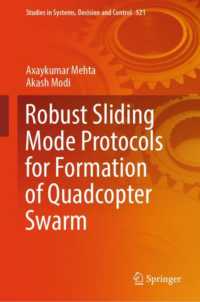- ホーム
- > 洋書
- > 英文書
- > Psychology
Full Description
Researching the Unconscious provides an exposition of key issues in the philosophy and methods of the social sciences that are relevant to psychoanalysis, both as a clinical practice and as a human science.
These include the debates initiated by Thomas Kuhn's theory of scientific revolutions, the "actor-network theory" of Bruno Latour, the ideas of philosophical realism, distinctions between "meaningful" and "causal" explanation, and the relevance of complexity theory and "part-whole analysis" to psychoanalysis. The book goes on to discuss specific forms and methods of psychoanalytical research, including the role of case studies, of outcome research, and of "grounded theory" as a key methodological resource, of which it provides a detailed example. The book concludes by outlining principles and methods for psychoanalytic research in the wider contexts of infant observational studies, society, and culture.
Michael Rustin provides a unifying account of the methodological principles that underlie the generation of knowledge in psychoanalysis, in the light of recent developments in the philosophy and sociology of science. In doing so, it provides a coherent rationale for psychoanalytic investigation, which will be of value to those pursuing research in this field.
Researching the Unconscious is unusual in its being based both on a deep understanding of and respect for psychoanalytical clinical practice and on its author's wider knowledge of the philosophy and sociology of science. It is unique in its comprehensive approach to the principles of psychoanalytic research.
Contents
Series editors' preface; Acknowledgements; Preface; Chapter 1: Introduction; Chapter 2: Psychoanalysis as a scientific paradigm; Chapter 3: The consulting room as the psychoanalytic laboratory; Chapter 4: Philosophical realism and its relevance; Chapter 5: Meanings and causes in psychoanalytical explanation; Chapter 6: On classification; Chapter 7: Case-study methods in psychoanalysis; Chapter 8: Parts and wholes: different kinds of explanation; Chapter 9: Complexity theory and psychoanalysis; Chapter 10: Clinical facts; Chapter 11: Grounded theory in psychoanalysis and child psychotherapy; Chapter 12: Grounded theory in child psychotherapy: an example; Chapter 13: Outcome studies; Chapter 14: Observational research methods; Chapter 15: Socio-psychoanalytic research; Chapter 16: Psychoanalytic cultural methods; References








